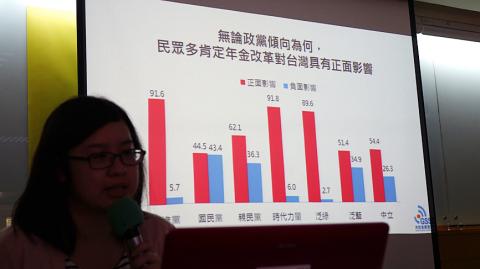President Tsai Ing-wen’s (蔡英文) overall approval rating has rallied to 51.6 percent on the back of the passage of pension reform bills, a poll released yesterday by the Taiwan Style Foundation showed.
The poll found that more than 60 percent of respondents were satisfied with Tsai’s pension reform performance, while her approval rating climbed 4.9 percent from a July 3 survey.
However, her disapproval rating was 40.8 percent, and while 41.4 percent of those polled said they were satisfied with her overall performance — an 8 percentage-point increase from the July 3 poll — 54.3 percent said they were dissatisfied.

Photo: George Tsorng, Taipei Times
The approval rating of Premier Lin Chuan (林全) has also risen, from 28.7 percent on July 3 to 34.7 percent, but his disapproval rating remains high at 57.7 percent, the poll showed.
The Act Governing the Retirement and Pensions of Public-School Teachers and Employees (公立學校教職員退休撫卹條例) passed on June 27 reduced the pension benefits of public-sector employees.
Asked if they were satisfied with the reform, 62.8 percent of respondents said they were, while 31.1 percent said they were not.
The reform would have a positive effect on the nation’s development, 68.1 percent of respondents said, but 21.6 percent said it would have a negative effect.
While 61.9 percent of those polled said pension reform was a major achievement for Tsai, 30.6 percent said it was not.
The poll showed bipartisan support for the act across age groups and regions, suggesting the reform has hit its mark, Democratic Progressive Party (DPP) Legislator Wang Ding-yu (王定宇) said.
“Tsai’s administration has to understand that public support would grow if it does the right thing and explains policies well. However, it would lose both [supporters and opponents of the pension reform] if it makes compromises to curry favor,” Wang said.
Regarding the Forward-looking Infrastructure Development Program, 61.5 percent of respondents said it would benefit the nation, while 27.3 percent said it would not.
While 59.3 percent of respondents supported the government’s introduction of the program, 31.1 percent opposed it.
The Chinese Nationalist Party’s (KMT) obstruction of Lin’s budget report for the program was approved by 26.8 percent of respondents, but disapproved by 60 percent.
The obstruction of legislative proceedings would negatively impact the KMT according to 50.4 percent of the respondents, while 30.2 percent said it would have a positive effect.
On the question of who should run Taipei, 59.5 percent of respondents said the DPP should field its own candidate instead of again backing independent Taipei Mayor Ko Wen-je (柯文哲), while 20.7 percent opposed the idea.
That 72.1 percent of the DPP-inclined respondents wanted the party to pitch its own candidate suggests Ko’s support base is abandoning him, DPP Legislator Chuang Ruei-hsiung (莊瑞雄) said.
The poll was conducted on Sunday and Monday, collected 1,069 valid samples and has a confidence level of 95 percent and a margin of error of 2.99 percentage points.

Chinese Nationalist Party (KMT) Chairman Eric Chu (朱立倫), spokeswoman Yang Chih-yu (楊智伃) and Legislator Hsieh Lung-chieh (謝龍介) would be summoned by police for questioning for leading an illegal assembly on Thursday evening last week, Minister of the Interior Liu Shyh-fang (劉世芳) said today. The three KMT officials led an assembly outside the Taipei City Prosecutors’ Office, a restricted area where public assembly is not allowed, protesting the questioning of several KMT staff and searches of KMT headquarters and offices in a recall petition forgery case. Chu, Yang and Hsieh are all suspected of contravening the Assembly and Parade Act (集會遊行法) by holding

PRAISE: Japanese visitor Takashi Kubota said the Taiwanese temple architecture images showcased in the AI Art Gallery were the most impressive displays he saw Taiwan does not have an official pavilion at the World Expo in Osaka, Japan, because of its diplomatic predicament, but the government-backed Tech World pavilion is drawing interest with its unique recreations of works by Taiwanese artists. The pavilion features an artificial intelligence (AI)-based art gallery showcasing works of famous Taiwanese artists from the Japanese colonial period using innovative technologies. Among its main simulated displays are Eastern gouache paintings by Chen Chin (陳進), Lin Yu-shan (林玉山) and Kuo Hsueh-hu (郭雪湖), who were the three young Taiwanese painters selected for the East Asian Painting exhibition in 1927. Gouache is a water-based

Taiwan would welcome the return of Honduras as a diplomatic ally if its next president decides to make such a move, Minister of Foreign Affairs Lin Chia-lung (林佳龍) said yesterday. “Of course, we would welcome Honduras if they want to restore diplomatic ties with Taiwan after their elections,” Lin said at a meeting of the legislature’s Foreign Affairs and National Defense Committee, when asked to comment on statements made by two of the three Honduran presidential candidates during the presidential campaign in the Central American country. Taiwan is paying close attention to the region as a whole in the wake of a

OFF-TARGET: More than 30,000 participants were expected to take part in the Games next month, but only 6,550 foreign and 19,400 Taiwanese athletes have registered Taipei city councilors yesterday blasted the organizers of next month’s World Masters Games over sudden timetable and venue changes, which they said have caused thousands of participants to back out of the international sporting event, among other organizational issues. They also cited visa delays and political interference by China as reasons many foreign athletes are requesting refunds for the event, to be held from May 17 to 30. Jointly organized by the Taipei and New Taipei City governments, the games have been rocked by numerous controversies since preparations began in 2020. Taipei City Councilor Lin Yen-feng (林延鳳) said yesterday that new measures by